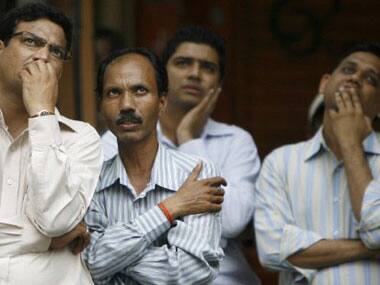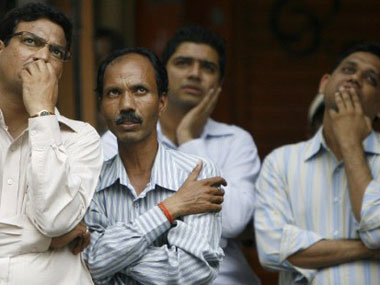The slew of economic policy measures announced in the last couple of weeks has come as a breath of fresh air and reassured us that things are moving.More importantly, the government has taken the lead in countering political opposition and come out successful, though one may not be too comfortable with the new alliances which have different ideologies.
The government has, however, reiterated two things. The first is that in a democracy which involves coalitions, there is a need to argue and discuss issues before taking decisions. As a corollary, whatever has been done now is not really anything new. These were merely old issues which got sorted out recently. We have been told that there will be more to follow, which is good news, as the market has already reacted positively and there are signs that this will continue as the overall mood or sentiment improves.
However, while it is maintained that we have taken all these measures consciously based on the two issues spoken of earlier, there have been Freudian slips in several statements which suggest that these measures should assuage the sentiments of the rating agencies. One can sense a feeling of dj vu, because in 1991, when we went in for reforms, it was the IMF hand which did the steering. Is it the S&P’s that has motivated the government?
[caption id=“attachment_467254” align=“alignleft” width=“380”]
 Will the economy turn around? Not immediately, of course, as all these measures do not have a significant bearing on inflation, low investment, industrial stagnation and declining corporate profits.Reuters[/caption]
Will the economy turn around? Not immediately, of course, as all these measures do not have a significant bearing on inflation, low investment, industrial stagnation and declining corporate profits.Reuters[/caption]
Looking at all that has been done, what does it mean for everyone? For the common man, higher diesel and LPG prices mean a great hit on inflation because, while it makes economic sense for the government to rein in the deficit, when the Consumer Price Index (CPI) inflation is 10 percent, such reforms are hard to digest. This is so because he understands inflation more than fiscal austerity.
The lesson for the government is that if the same were implemented over a period of time at say Re 1 per litre per month, it would not have hurt that much. Hopefully, this will happen in future. FDI in retail does not affect the common man and if it works out, the aam aadmi will benefit through better choice, quality, price and shopping experience. But, that is futuristic.
For the time being, the government’s critics have been silenced even though some may argue that what has been done is not enough. But, the government can be pleased nonetheless that it has gone ahead with these moves and the Trinamool factor has been gotten over. The lesson now should be that rather than spacing out reforms, all announcements should be done together so that the political bricks do not get de-cemented, as the parties supporting the government have different ideologies and could pull the rug in future.
Second, the government needs to do some introspection in terms of its own budget processes. The budget had assumed that the fuel subsidy for the year will be Rs 43,500 crore for this year based on an average crude oil price of $ 115 a barrel. Since the budget has been announced, this number has not been exceeded and had also dipped below the $ 100 mark for quite a while. If this is so, how can it be talking of the bill already crossing Rs 140,000 crore which can go up to Rs 200,000 crore, if not checked through higher prices now? Quite clearly the budgetary exercise should make more pragmatic assumptions.
The reforms-opposing parties have clearly been put on the sidelines on account of these decisions which, in a way, is a setback because it is unlikely that the government will stop now with placatory policies. It clearly means business going ahead.
The retailers should not really be affected to begin with. The fact that states have to take the decision and that the Wal-Marts will be restricted to the big towns is a safeguard. We have already seen that domestic organised retail has not been too successful and any foreign entry could meet with opposition from the masses. So clearly, the movement will be slow and measured.
Also the kirana stores have advantage of their own: proximity to the customer with the ability to provide short-term credit, ability to supply small quantities, strong relationships, and convenience. These will never go out of fashion. Given that organised retail requires space, they cannot cover the interiors of cities, making access a challenge even in the bigger towns. People visit these stores on a weekly basis, but rarely on a daily basis. The fear of displacement needs to be examined more closely with probably less emotion.
Will the face of agriculture change? Only in the long run, only if big retail becomes all- pervasive. One must not get carried away by the argument that FDI will provide a panacea for our farming ills. It is one part of the story. Even today organised retail has limited space for horticulture. Not more than 10 percent of the shopping floor is used for such products. The rest is for other consumer products.
FDI will build value chains for a limited supply of products to the consumer in specific geographies through contract farming. Hence, to begin with, it will be extremely niche segments that they will be looking at. We should not think that FDI will take over the entire agriculture sector and transform it into a high yielding sector that addresses issues of land under cultivation, productivity, crop selection, output, logistics, marketing and the retail sale.
Will the economy turn around? Not immediately, of course, as all these measures do not have a significant bearing on inflation, low investment, industrial stagnation and declining corporate profits.Higher diesel prices will improve the fiscal deficit for sure, but has to be followed up with similar actions in line with the movement in prices. FDI in retail or airlines will work over a period of time. They are more of signalling mechanisms.
The disinvestment announcement is big and it is believed that the target this year will be achieved, which will keep the stock market alive. The same holds for the reduction of withholding tax on interest on foreign loans. These are all sentiment boosters, which by themselves do not add to immediate GDP or lower inflation.
But coming more to the immediate problems of the country, are any of these measures likely to boost investment and industry this year? Probably no. Will inflation come down due to these pragmatic measures? Definitely not. Will the balance of payments improve this year? Only if FII and FDI flows come in, which is possible due to the quantitative easing done by the US and ECB. Also, the deferment of GAAR and retrospective taxation has been useful in this context.
Will the exchange rate become steady? Probably yes, as the dollar weakens, this should help. Will agricultural growth improve? Not in the short or medium run. Even when FDI comes in, it will improve the value chain but not production or irrigation or productivity, as it will be confined to certain pockets where they have contract arrangements. Have any of the infrastructure problems been addressed? Not yet. Therefore, no big changes in farm production as such can be anticipated immediately this year.
More than coalition partners agreeing with big decisions, the various ministries need to work together. Two links have to be logically followed. First, the power sector is linked with coal which is linked with mining that is linked with land that is linked to environment. The second one is agricultural pricing policies linked with inflation that link to the RBI and its policy rates which, in turn, are linked to investment and industrial growth and GDP. The agriculture ministry, petroleum ministry, RBI and finance ministry have to talk to each other continuously. Presently, the finance ministry is on strong turf by increasing fuel prices, but the RBI has a problem on hand with inflation. With inflation bound to rise, how does it address monetary policy?
Therefore, there are a lot of good things that have come up, and the fact that we have not gone back with rollbacks is a positive. We can expect more, but nothing dramatic which requires parliamentary approval. We should not expect serious changes in the state of the real economy, which means absolute growth, but all these measures uplift sentiment for foreign investment, which will help. And more importantly, it sends the right signals to the rating agencies. These concerns seem to have operated somewhere in the background.
The author is Chief Economist, CARE Ratings. These views are personal
)